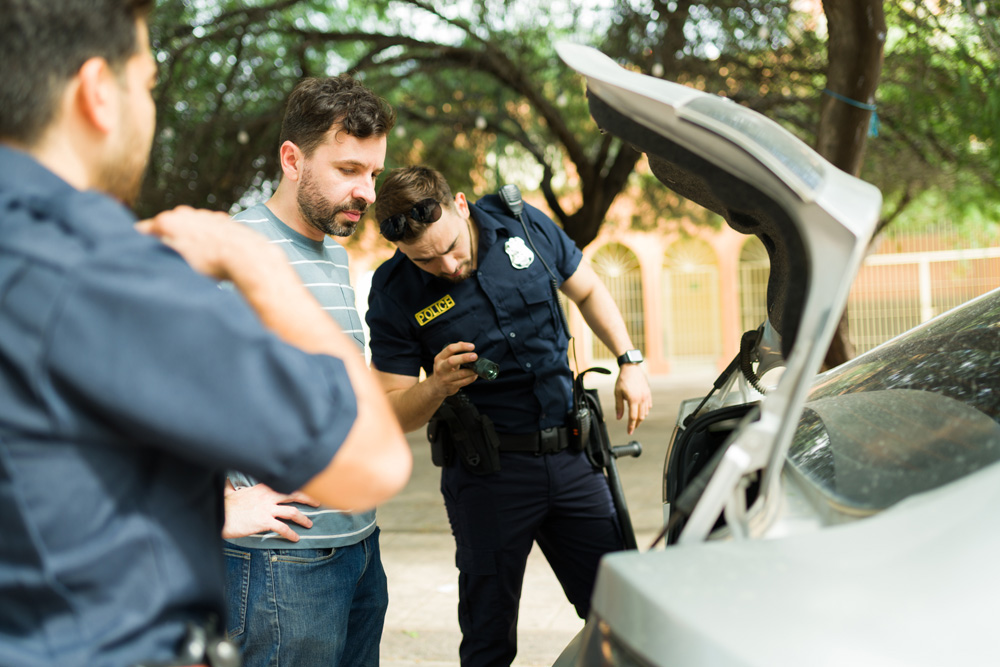
How to Handle a Vehicle Search After a Florida Traffic Stop
If a police officer stops your vehicle, the interaction might result in a search. While the police officer may ask to search your vehicle, you are allowed to refuse consent to a search. On the other hand, the police officer may have probable cause to search your vehicle and proceed without your consent. Whether the search of your vehicle occurs with or without your consent, you should remain calm and avoid interfering with the officer’s search.
If a police officer discovered evidence against you in a search of your vehicle without your consent, you may be able to challenge the search’s legality in court. The Fourth Amendment protects people from unlawful searches and seizures, and a skilled criminal defense attorney may be able to help you prove that the police officer acted unlawfully by searching your vehicle. At Fighter Law, our team of experienced criminal defense attorneys want to help defendants like you protect your constitutional rights.
Can the Police Search My Vehicle If I Refuse?
When you are pulled over by a police officer, the officer may ask to search your vehicle. You can refuse a search of your vehicle, but there are certain circumstances in which the officer can conduct a search anyway.
Police officers cannot search your vehicle based on a hunch that you have committed a crime. The law requires that officers possess probable cause to conduct a search. The officer must have enough evidence or information to suspect that a search will reveal criminal activity. An officer might have probable cause to search based on the following:
- The officer sees contraband in plain view.
- The officer smells contraband coming from the vehicle.
- The driver’s behavior is suspicious.
- The officer was informed beforehand that the driver had illegal contraband in the vehicle.
- If the traffic stop results in an arrest, the officer can search the immediate area within your reach and control in a search incident to arrest.
An officer can search your vehicle without your consent when there is probable cause to do so; however, an officer must ask for your consent if they do not have sufficient probable cause. If you consent voluntarily and without being coerced, the search will most likely be upheld in court. On the other hand, you are fully within your constitutional rights to refuse to give consent to a search of your vehicle.
What Should You Do During a Search of Your Vehicle After a Traffic Stop?
When handling a search of your vehicle after a traffic stop, you should remain calm and be respectful. If the officer asks permission to search, you are allowed to refuse consent. Most officers will respect your refusal and continue with the traffic stop if they have no probable cause to search your vehicle without your consent. Always be polite, remain calm, and give respect to the officer. Any aggression or nervousness on your part might be interpreted as you trying to hide something from the police.
If an officer searches your car without your consent, the officer probably believes he or she has probable cause to do so. You should not confront the officer or try to interfere with the search in any way. Interfering with the officer’s search could potentially lead to an arrest. Instead, you should plan to contact a criminal defense lawyer who can help you challenge the search’s legality in court.
Contact Fighter Law’s Experienced Criminal Defense Attorneys to Discuss Whether You Can Challenge the Search of Your Vehicle
Police officers may ask to search your vehicle after stopping you, and you have the right to refuse to give your consent. The officer may still search your vehicle without your consent if they have probable cause. Probable cause can arise from the plain view of contraband, the smell of contraband, the suspicious behavior of the driver, or a tip given to the police. When an officer searches your vehicle without your consent, you should remain calm and plan to contact board-certified lawyer Thomas Fighter and his outstanding legal team.
Fighter Law’s dedicated criminal defense attorneys want to help you today. To speak with someone on our team, you can fill out our contact form or call (407) 344-4837 today.
Share:
free case evaluation
Fill out the form below for an free evaluation of your case.
Categories
- Birth Injury
- Boating Accidents
- Car Accidents
- Civil Rights
- Criminal Defense
- Cyberstalking
- Divorce
- Dog Bite Injury
- Domestic Abuse Charges
- Domestic Violence
- Drug Charges
- DUI Charges
- Family Law
- Felonies
- Fighter Law Firm
- Firearms
- Firm News
- Guardianship
- Injunction Removal
- Injunctions
- Marketing
- Personal Injury
- Repeat Violence Injunction
- Restraining Order
- Seal and Expunge
- Self Defense
- Sex Crimes
- Slip and Fall
- Stalking Injunction
- Theft and Robbery
- Theme Park Trespasses
- Traffic tickets
- Uncategorized
- Wills and Trusts

